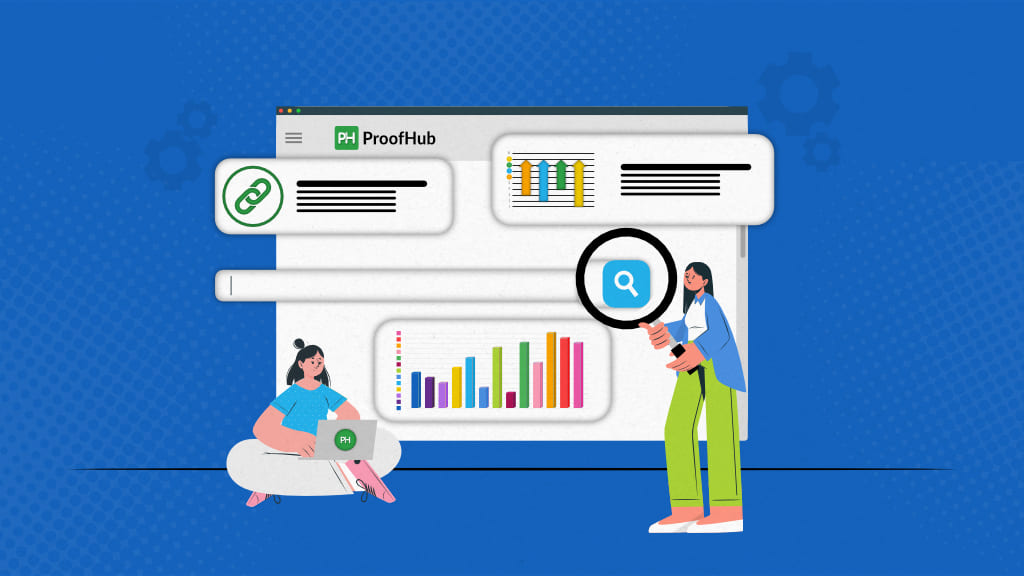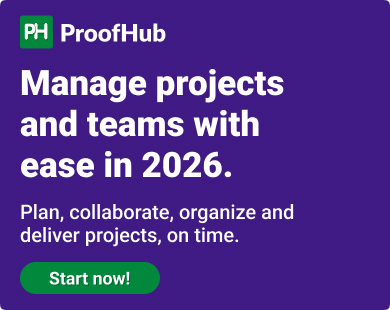Search engine optimization (SEO) feels like a constant state of flux.
From juggling keyword research, content marketing, collaboration, and website optimization to managing multiple projects and tracking your campaign progress, handling the project management aspect of SEO strategy can become stressful.
An SEO focused project management software can make your life easy, help you in your SEO project planning, and ward off your operational burnout.
Whether you’re just starting your journey to entrepreneurship or a seasoned SaaS SEO agency, these software are must-haves to knock out heaps of work quickly.
Let’s get into detail to pep up your preparation.
Best SEO project management software
After sifting through countless marketing tools, my top picks include –
1. ProofHub
ProofHub, an all-in-one SEO project management tool, that serves as a bulletin board system for all the projects and tasks related to your SEO campaigns.
Whether asking your team for project status updates or strategizing your SEO efforts, ProofHub allows you to optimize your overall SEO strategy for maximum efficiency.
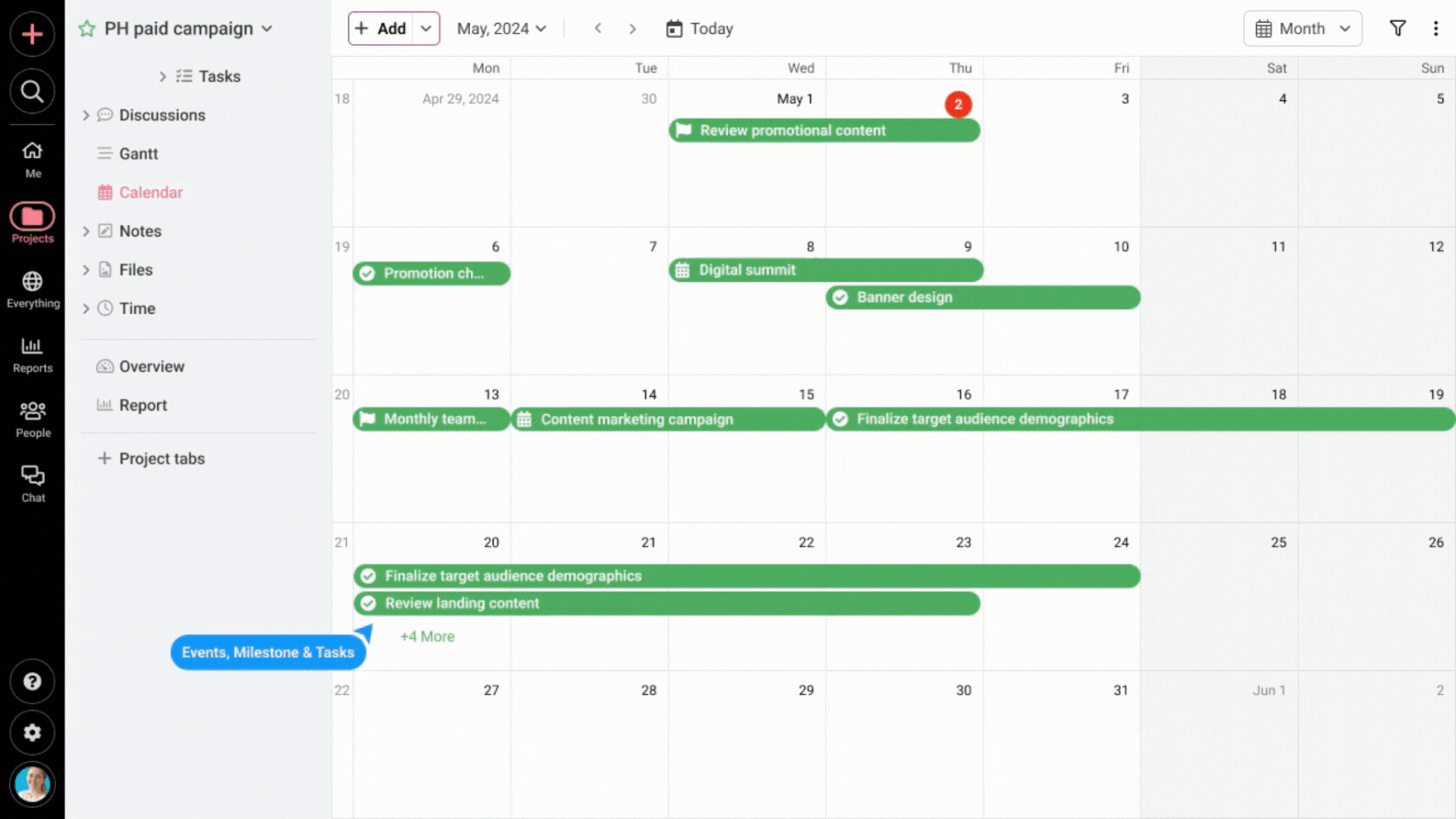
With its easy-to-pick-up interface, you don’t need extensive training or experience to get the hang of it. Just set it up, and you are good to go. Also, it’s a scalable solution and a great investment for teams of all sizes, especially if you are a startup company.
“ProofHub changed how our marketing team works, saving us lots of time we used to waste switching between different apps.”
Key features
- Create, manage, assign, and track tasks using a smart task management application.
- Request forms to collect valuable information, manage feedback, and support queries.
- Get valuable insights into your task and team performance using comprehensive reports.
- Online proofing to review, leave feedback, and approve files and documents.
- Profile views are used to track individuals’ activities and utilize the data for effective resource allocation.
- Set clear goals, milestones, and reminders to remove any uncertainty and delays.
- Real-time built-in online chat and group discussions for enhanced collaboration and file sharing
- Effective time management to deliver work on time
- Optimize and customize workflow using ProofHub according to your needs
Pros
- An all-in-one solution for every project and team
- Intuitive user interface for simpler navigation
- Flat-fee pricing models promote scalability
- Cater to different time zones and locations
- Transparency into workflow and customization for teams
- Centralized platform to store, access, and share files/documents
Cons
- Not that suitable for single users and freelancers.
Price
The no-per-user fee is a steal for everyone looking to enhance their SEO campaign strategies. You can utilize its 14-day free trial to become familiar with its user-friendly platform.
Paid plans:
- Essential plan for unlimited users at $45/month when paid annually
- Ultimate Control plan for unlimited projects, users, and features at $89/month (when billed annually)
User ratings
- Capetera: 4.5
- G2: 4.5
Collaborate, communicate, and execute your SEO campaigns. Try ProofHub for free
2. Evisio
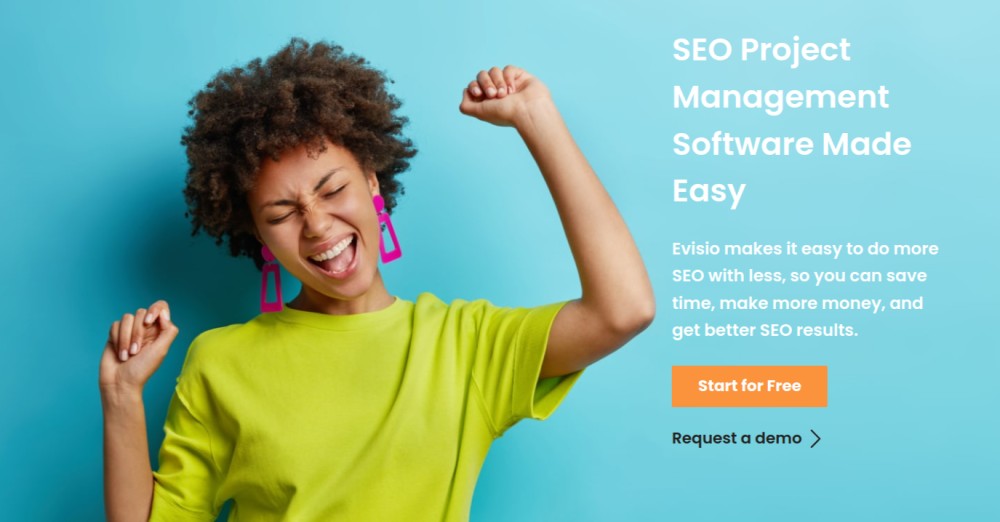
Evisio is an SEO project management solution with robust features to help SEO teams escape all the intricate worries. Addressing every project aspect, including auditing, analyzing, and customizing strategies, it streamlines your SEO process and assists you in growing your online presence.
Key features
- Evisio dashboard to get the gist of your SEO tasks
- Evisio automation to save time on mundane tasks
- Progress reports to share with clients for updates
- Task management to manage and delegate tasks
Pros
- Live chat support
- Built-in site audit
- Suitable for medium to large size teams
Cons
- Can be expensive for small teams
- Has some learning curve
- Limited reporting and customization capability
Price
You can activate Evision’s free plan anytime for 5 limited users. But if you want more user accessibility, choose from either of the following plans.
- The manager plan is priced at $79 per month
- Pro plan is priced at $79 per month
- Executive plan priced at $79 per month
- The customer plan is priced at $79 per month.
User ratings
- G2: 5
Website link: Evisio.co
3. Bonsai
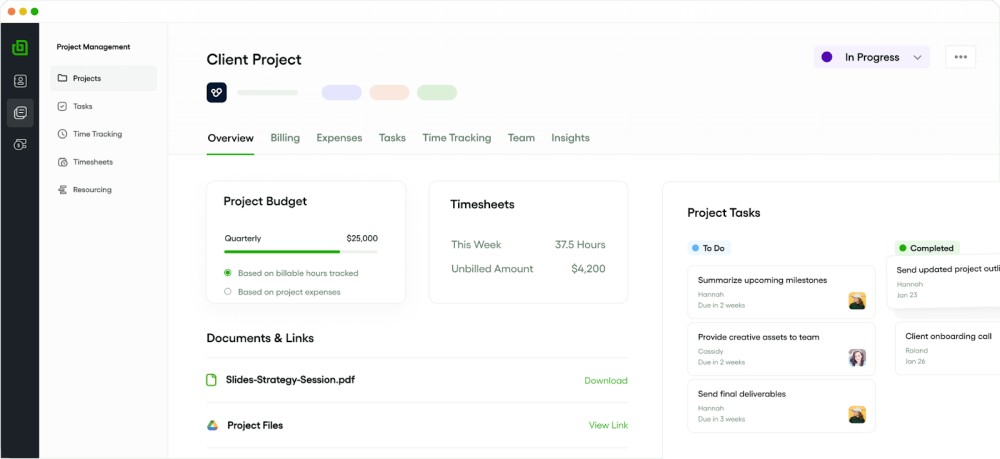
Bonsai is a versatile project management software designed specifically for agencies and small businesses to manage SEO projects and clients efficiently. It offers an integrated platform that simplifies task management, team collaboration, and client communication, making it an ideal choice for improving your SEO project management processes.
Key features
- Task tracking, assignment and team collaboration
- Workload management with utilization and profitability reports
- Built-in time tracking and client billing
- Client portal to keep clients informed and engaged
Pros
- Workflows are designed with agencies in mind
- Centralized platform for project, client and financial management
- In-depth reporting
Cons
- No built-in chat
- In-depth reporting is limited to higher pricing plans
- Advanced workflow automation is not available in the Starter plan
Price
A 7-day free trial is available for all plans. 1 free user is included in all of them.
- Starter plan: $21 per month + $10 per additional user/month
- Professional plan: $32 per month + $10 per additional user/month
- Business plan: $66 per month + $10 per additional user/month
- Scale plan: Custom pricing based on your needs.
User ratings
- Capterra – 4.6 of 5
- G2 – 4.3 of 5
Website link: Hellobonsai.com
4. Basecamp
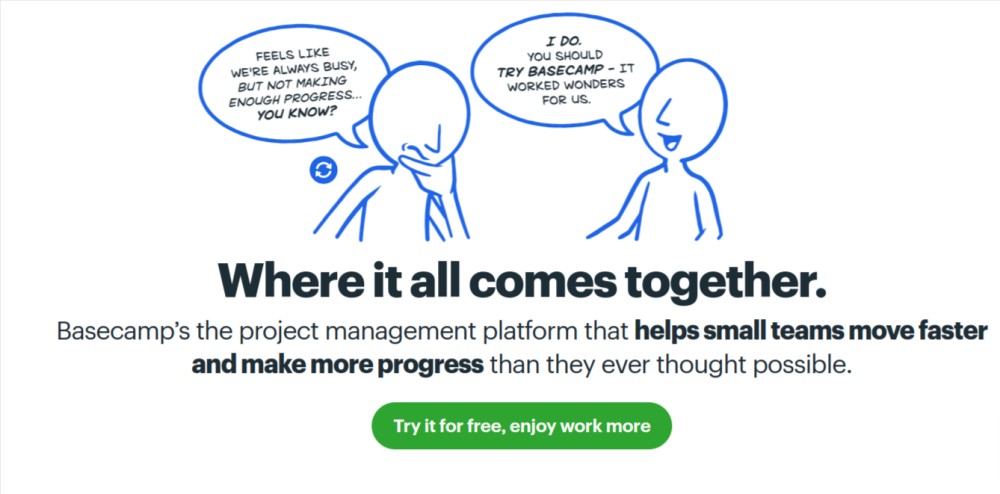
Basecamp allows SEO team members to break projects into small tasks. It doesn’t overwhelm you with countless features but offers just enough to complete every perspective of your projects and campaigns. Further, you can efficiently collaborate and communicate with your team and stakeholders with built-in chat.
Check out our guide to Basecamp alternatives for decent project management solutions.
Key features
- Campfire built-in chat for instant messaging
- To-dos to track the progress and deadlines of your SEO tasks
- Card table for visualizing task progress stages
- Doors to integrate third-party applications
Pros
- Easy to use
- Granular control over SEO strategy
- Invite guests free of cost
Cons
- Advanced time tracking is not available
- Expensive pro unlimited plan
- Lack of customization
Price
With a 30-day free trial, Basecamp’s other simple two pricing options are:
- Basecamp plan at $15/user/month (billed annually)
- Basecamp Pro Unlimited at $299/month (billed annually)
User ratings
- Capetera: 4.3
- G2: 4.1
Website link: Basecamp
5. Flowlu
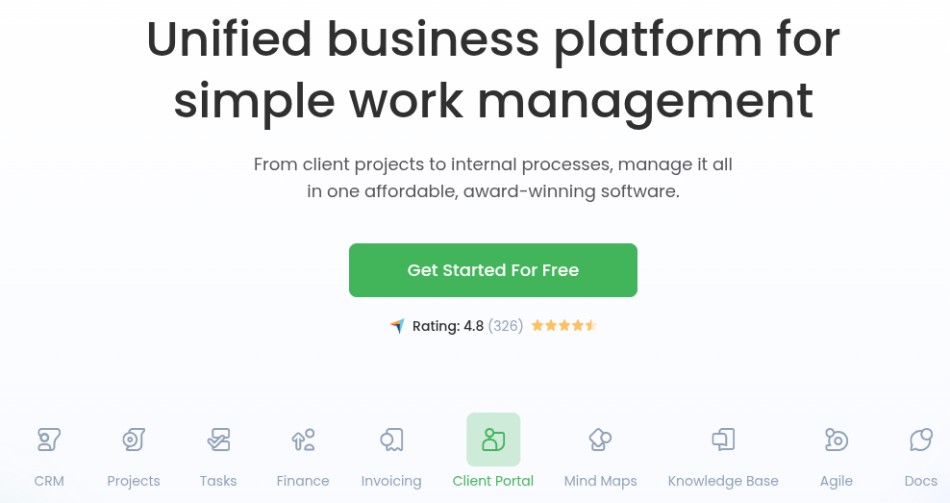
Flowlu is a work management platform for digital marketing agencies, SEO professionals and in-house marketers. With visual planning tools, SEO project templates, powerful automations and time tracking, it simplifies every step of your SEO workflow.
Key features
- Launch projects in seconds with SEO-specific templates covering all main work areas
- Map out SEO campaigns on Gantt charts and calendars, and execute with Kanban and list views
- Collaborate in comments and chats; get feedback and client approval in secure portals
- Monitor time spent, budgets, and expenses; generate invoices and get paid with a click
Pros
- Affordable, all-in-one work app
- No-code automations for any workflow
- Seamless client and team collaboration
Cons
- Slight learning curve
- No advanced automation at free tier
- Financial module can feel overwhelming
Price
Along with a 14-day free trial and free plan, you can choose from 4 paid pricing plans:
- Team at $39/team/month (billed annually), adds client portal, time tracking, recurring tasks & invoices
- Business at $79/team/month (billed annually), includes unlimited automations, P&L reports, cash flow forecasts
- Professional at $159/team/month (billed annually), advanced reports, multi-entity financials, extended template library
- Enterprise at $263/team/month (billed annually), white-labeling, custom domain, dedicated success manager
User ratings
- Capterra: 4.8
- G2: 4.7
Website link: Flowlu
6. Wrike
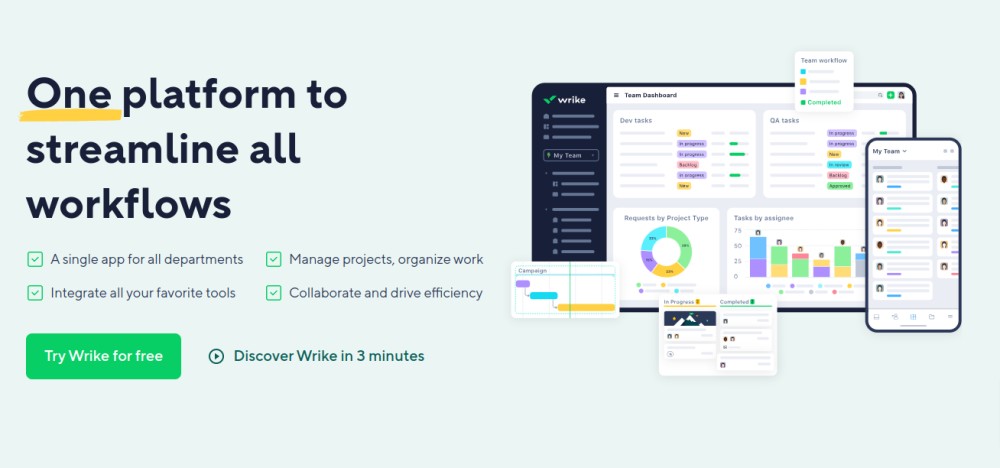
Wrike, introducing itself as a marketing management and campaign planning tool, simplifies the strategy planning process while keeping SEO projects on track. You can also easily gauge resource capacity, launch campaigns effectively, and utilize real-time insights to improve campaign performance.
If Wrike’s paid plans feel a bit pricey to you, check out our guide to Wrike project management alternatives
Key features
- Workload view to stay on top of resource productivity
- Kanban boards to track project updates
- Shared space for your SEO resources
- Performance metrics provide real-time data insights
Pros
- Offers 24/7 email and chat support
- Automation to save time
- Feature-rich Android and iOS versions
Cons
- Expensive pricing plans
- Steep learning curve
- Limited functionality of the free plan
Price
Along with Wrike’s 14-day free trial and its free plan for intelligent task management, you can choose from –
- Team plan at $9.80/user/month (billed annually)
- Business plan at $24.80/user/month (billed annually)
- Enterprise plan at custom pricing for large teams (billed annually)
- Pinnacle plan at custom pricing for teams with complex needs
User ratings
- Capetera: 4.3
- G2: 4.2
Website link: Wrike
7. Notion
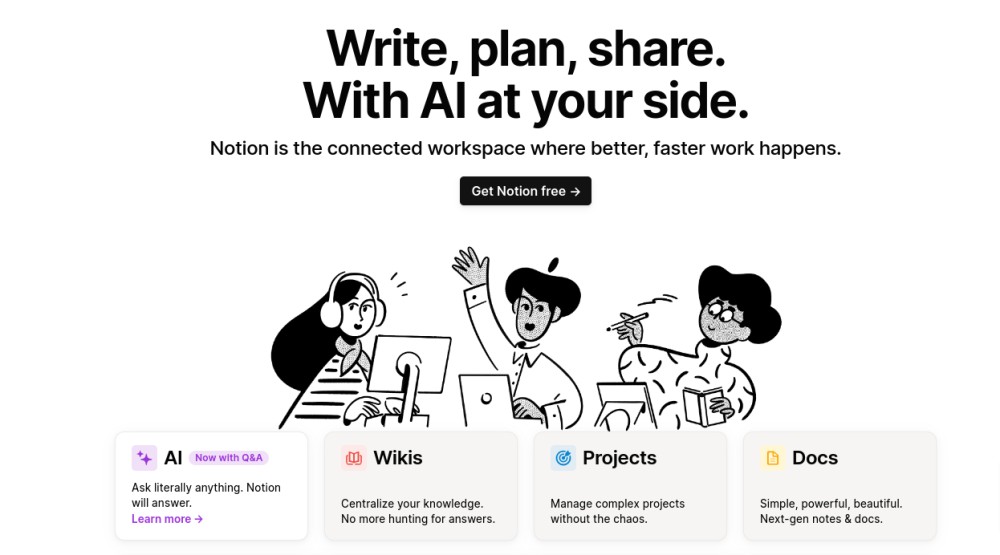
The notion, apart from its robust note-taking application “Blocks,” emerges to be a great solution to your SEO project management needs. The platform offers a versatile user experience, allowing SEO teams to customize their workflow, create project databases, and enhance their project efficiency.
Key features
- Wikis to centralize all your SEO strategy knowledge
- Template Gallery provides a range of built-in templates for various categories
- Timeline view to get a bird’s eye view of dependencies
- Offers integration with Slack, GitHub, and more.
Pros
- Seamless customization
- Decent free plan
- iOS and Android apps available
Cons
- Paid pricing plans can be expensive
- Does not offer two-factor authentication
- No formal report generation functionality
Price
Notion’s free plan is great for both individuals and small teams, as far as the guest number they need to cater to is below 10. Rest, the other plans are –
- Plus plan is priced at $8/user/month on annual billing
- Business plan is priced at $15/user/month on annual billing
- Enterprise plan is great for teams requiring advanced control and support. Contact the sales team for more information.
User ratings
- Capetera: 4.8
- G2: 4.7
Website link: Notion
8. Teamwork
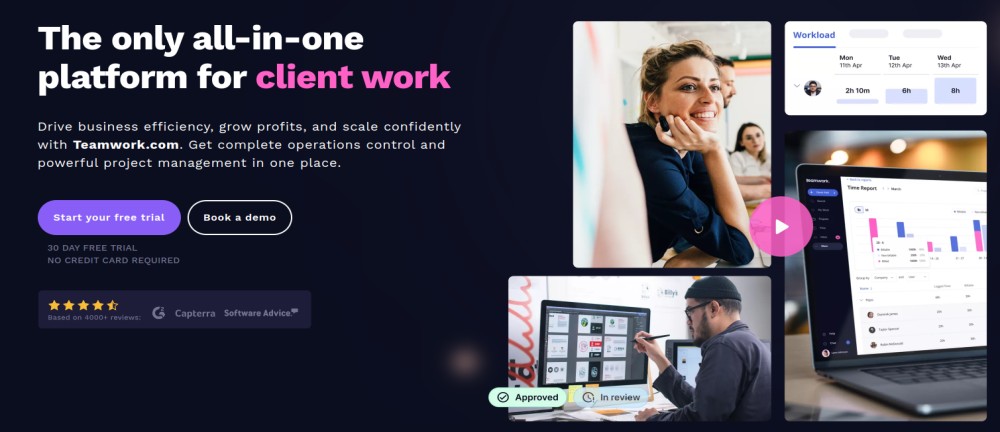
Teamwork calls for its firm spot and is a great SEO project management tool if you are a marketing agency dealing with client work. With its simple-to-navigate interface, you can manage multiple projects with utmost simplicity and invite users to collaborate on them.
Check out the comparison between ProofHub and Teamwork and choose the best.
Key features
- Create, delegate, and assign SEO tasks using task management
- All time provides a brief overview of both billable and non-billable hours
- Task list and project templates to streamline repetitive tasks
- Insightful reporting to understand project status and health at a glance
Pros
- Unlimited free client access.
- Built-in client onboarding checklist template available
- Easy-to-use interface
Cons
- Teamwork chat needs to be integrated separately
- No intake forms for the free plan
- Multiple report formats are limited to higher pricing plans
Price
Teamwork offers various pricing tiers
- Starter plan costs $5.99/user/month on annual billing for 3 minimum users
- Deliver plan costs $9.99/user/month on annual billing with basic project management for 3 minimum users
- Grow plan at $19.99/user/month offers advanced project management for a minimum of 5 users
- Scale plan offers enterprise-level functionalities for which you need to request a demo.
User ratings
- Capetera: 4.5
- G2: 4.4
Website link: Teamwork.com
9. Trello
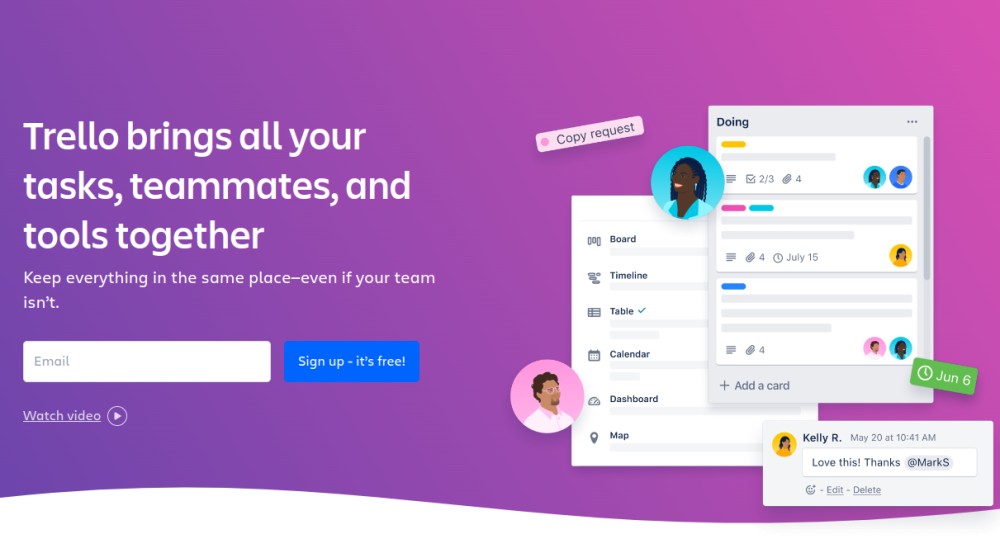
Trello is a board-based project management platform that creates a workspace to handle campaigns per your preferred requirements. You can create lists with separation between different projects. Or just link them all if the project is interdepartmental. However, the lack of a built-in chat option hinders quick communication.
Check out our full guide to Trello alternatives for enhancing project management functionalities
Key features
- Editorial calendar to keep track of your ongoing SEO campaign strategy
- 150+ power-ups to customize your experience
- Built-in automation to repeat the repetitive SEO tasks
- Trello boards to visualize your project progression
Pros
- Highly customizable
- Provides a handful of resources like Trello Ebook to optimize your campaigns
- Ready-made SEO content creation template available
Cons
- No built-in chat to facilitate team collaboration
- Insightful reporting is possible through power-ups only
- There is no common ground to track SEO project status when working on multiple boards
Price
Apart from Trello’s free plan with unlimited cards, other plans are-
- Standard plan at $5/user/month when billed annually
- Premium plan at $10/user/month when billed annually
- Enterprise plan at $17.50/user/month for large administrations
User ratings
- Capetera: 4.5
- G2: 4.4
Website link: Trello.com
10. ActiveCollab
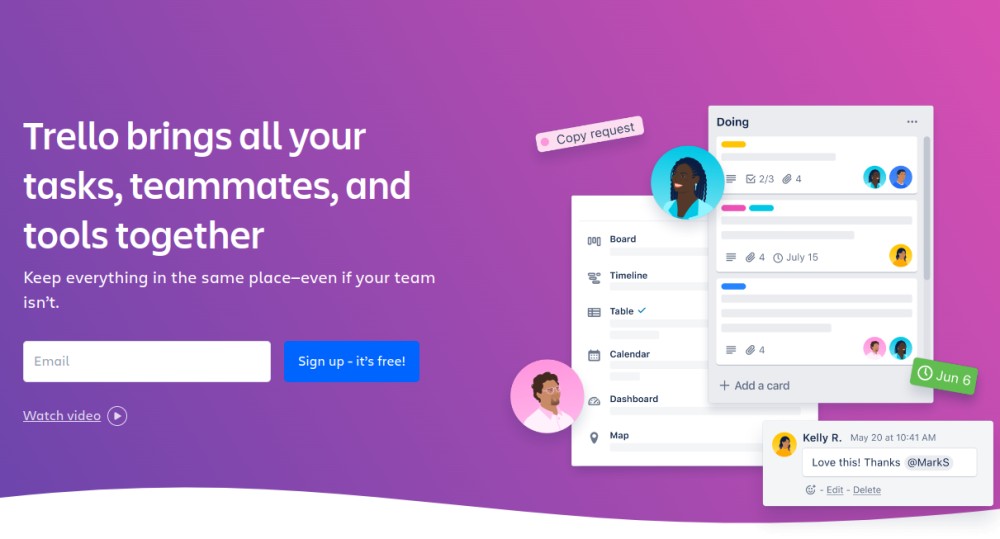
ActiveCollab emerges as one of the best SEO project management software. Famously known for its built-in invoicing and customizing capability, you can make the most of every minute spent and customize it to your preference. With no distractions to interrupt, you are free to provide real value to your clients.
Key features
- Personal and team timesheets to record billable hours
- Multiple task views like List, kanban, Calendar, and Gantt to get a visual overview of tasks
- Use timesheets or customized reports to build invoices
- Time reporting to compare time spent against estimated time
Pros
- Shared team calendar for keeping SEO projects on schedule
- Offers seamless integration with Zapier, Slack, Webhooks, Quickbooks
- Inviting an unlimited number of clients to the interface is possible
Cons
- Cannot generate time reports in the Plus plan
- Not so user-friendly interface
- Pro and Pro+Get Paid plans can be expensive for small teams.
Price
You can utilize ActiveCollab’s free access for 14 days, up to 3 members, and a limited storage of 1 GB. Rest, its three pricing plans are –
- Plus plan prices at $9.5 for 3 members per month
- Pro plan prices at $8/member/month
- Pro + Get Paid plan prices at $11.75/member/month
User ratings
- Capetera: 4.5
- G2: 4.2
Website link: Activecollab
11. Asana
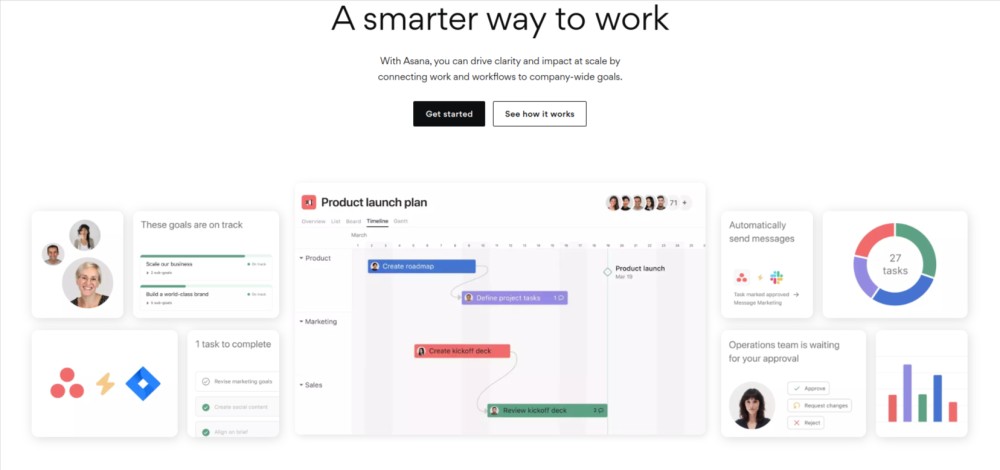
Asana is a simple project management tool with intuitive built-in goal management, allowing team members and collaborators to achieve business goals easily. This is handy for marketing agencies to onboard clients to the platform and share reports and work progress.
Check out our guide to Asana alternatives and explore some budget-friendly solutions.
Key features
- Customized forms to manage client requests
- Streamline your marketing plan by defining clear goals
- Task automation to streamline recurring tasks
- Real-time reporting dashboard for a clear overview of project status and timelines
Pros
- Over 100 integrations with application software, including Zoom, Dropbox, Zapier, and more
- Extremely flexible solution for SEO workflow
- Easy to plan and schedule tasks
Cons
- Paid plan can be expensive for handling limited SEO projects
- Lack of native time tracking
- Tracking task progress using Gantt is limited to pricing plans
Price
Asana’s Personal plan offers basic functionalities and is free for collaboration of up to 10 members. Apart from that, you get the following plans to choose from –
- Starter plan: $10.99/user/month (annual billing) for collaboration with up to 500 members
- Advanced plan: $24.99/user/month (annual billing) for advanced features like goals, workloads, and proofing.
- For Enterprise and Enterprise+ plans, you need to contact the sales team.
User ratings
- Capetera: 4.5
- G2: 4.3
Website link: Asana
12. Workamajig
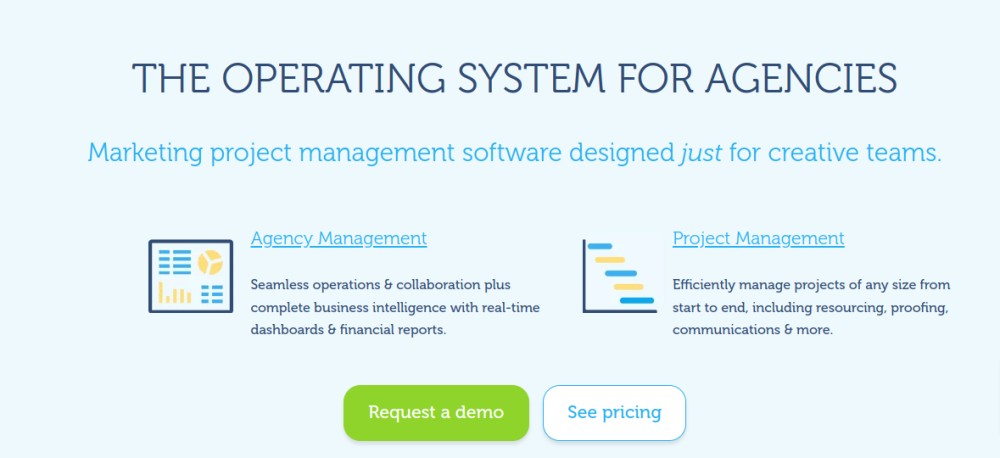
Workamajig is a marketing project management software designed for Workamajig is a marketing project management software designed for creative and marketing agencies. The platform offers comprehensive features that introduce visibility and accountability in your SEO plan. Also, with its custom reports, you can get real-time insights and send them directly to stakeholders or clients.
Key features
- Wide range of integration with invoicing software, CRMs, Google Calendar, Email, and more
- Sales dashboard for enhanced status and project visibility
- Today’s dashboard for a complete overview of tasks, times, and other updates
- Billing worksheets to generate invoices
Pros
- Free external vendor logins
- Built-in powerful project templates
- Real-time dashboards
Cons
- Expensive pricing plans
- The complex team onboarding process
- Does not provide in-depth reporting
Price
All three paid-pricing plans of Workamajig offer every feature. No features are plan-specific. On the annual billing of every plan, you get one month of free access.
- The in-house plan costs $39/user/month and is more suitable for teams
- The agency plan costs $39/user/month and is more suitable for agencies.
- Enterprise plan pricing needs to be discussed with the Sales team.
User ratings
- Capetera: 3.8
- G2: 3.8
Website link: Workamajig.com
13. Zoho Projects
Zoho Projects is a full-fledged project management software for SEO teams to handle their routine operations. From keeping a finger on the pulse of every task to setting milestones, you can easily break down your SEO workflow into more manageable tasks with a few clicks. The tool is well-suited for teams with restricted budgets.
If Zoho fails to meet your expectations, check out our guide to Zoho Alternatives
Key features
- Seamless integration with Zoho CRM
- Blueprints to automate your workflow
- Chat, feed, and Internet forum for improved collaboration
- Gantt charts to visualize SEO task progress and set dependencies
Pros
- Centralized cloud storage
- Easier to stay on top of everything
- Robust client portal
Cons
- Steep learning curve
- Complex user-interface
- There is no built-in time tracking in the free plan
Price
Along with its 10-day free trial and a free Personal plan limited to 3 users and 2 projects, Zoho offers two more plans to choose from.
- Premium plan at $4/user/month for advanced features
- Enterprise plan at $9/user/month, equipped with features suitable for larger teams
User ratings
- Capetera: 4.3
- G2: 4.3
Website link: Zoho.com
Why do SEO professionals need project management tools?
Search engine optimization and search engine marketing is a complex task in itself. And when you get to manage multiple SEO projects, keeping track of diverse tasks and deadlines becomes extremely daunting at times.
As a marketing manager, you bring out the best of your project management skills. Make sure to get a tool in your arsenal for the following reasons –
- Centralized software as a service application enhances your marketing strategy by bringing all your tasks to one platform. This way, you stay organized and productive.
- It helps streamline your SEO projects and structure your workflow to improve work efficiency.
- With multiple team members, like content writers, web developers, and marketing specialists, involved in SEO practices, the collaborative project management software for SEO facilitates real-time communication and knowledge sharing.
- Using SEO task management tools’ in-built reporting, you get insights into resource utilization to invest the right skill into the right task.
- You get real-time visibility into your SEO workflow and task management practices to make timely adjustments to your plan.
How to choose SEO Project management software?
When seeking the best SEO Project management software, evaluate the tool on these parameters before settling down on one.
- Start by understanding your specific needs and evaluate if the tool can address the challenges to your SEO workflow.
- After thorough analysis, narrow down the key features, including reporting, chat, and more, that you are seeking in a tool.
- Choose a user-friendly platform with a minimalistic learning curve.
- Take free trials to familiarize yourself with the basic interface before committing.
- Compare pricing plans, evaluate investment return, and get a scalable solution.
- Learn from other users’ experiences by reading user reviews on reviewing sites like G2, Capterra, etc.
- Look for in-house integrations to customize your workflow.
Look out for these top 10 things before choosing a project management software.
Conclusion
SEO is a dynamic and intricate task that requires supreme focus and effort. You scratch the surface and get loaded with multiple projects and campaigns scattered.
And amid all the chaos, getting yourself an SEO project management tool becomes essential to fill the gaps between organization and efficiency.
ProofHub commits to serving your purpose by keeping you organized and on track. It equips you with the necessary insights and features that prevent anything from falling through the cracks.
Frequently asked questions
What is SEO project management?
SEO project management is the practice of planning, organizing, and executing tasks involved in your SEO campaign. It also involves staying in sync with the tasks’ progress so that nothing falls through the cracks. The tasks include making web page audits, keyword research, link building, content creation, and more.
What are the responsibilities of an SEO project manager?
An SEO project manager needs to coordinate and oversee the organization’s SEO initiatives. They are responsible for web analytics, web marketing, resource management, evaluating performance indicators, and more.
